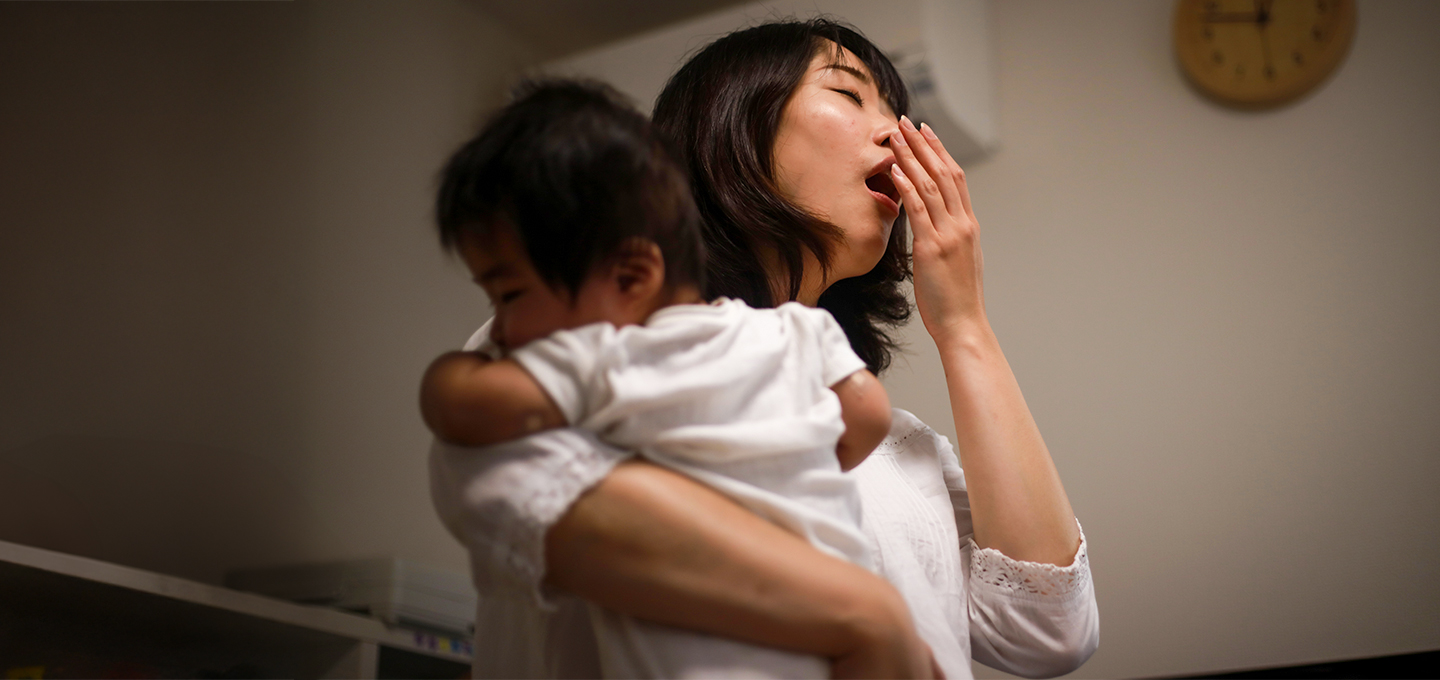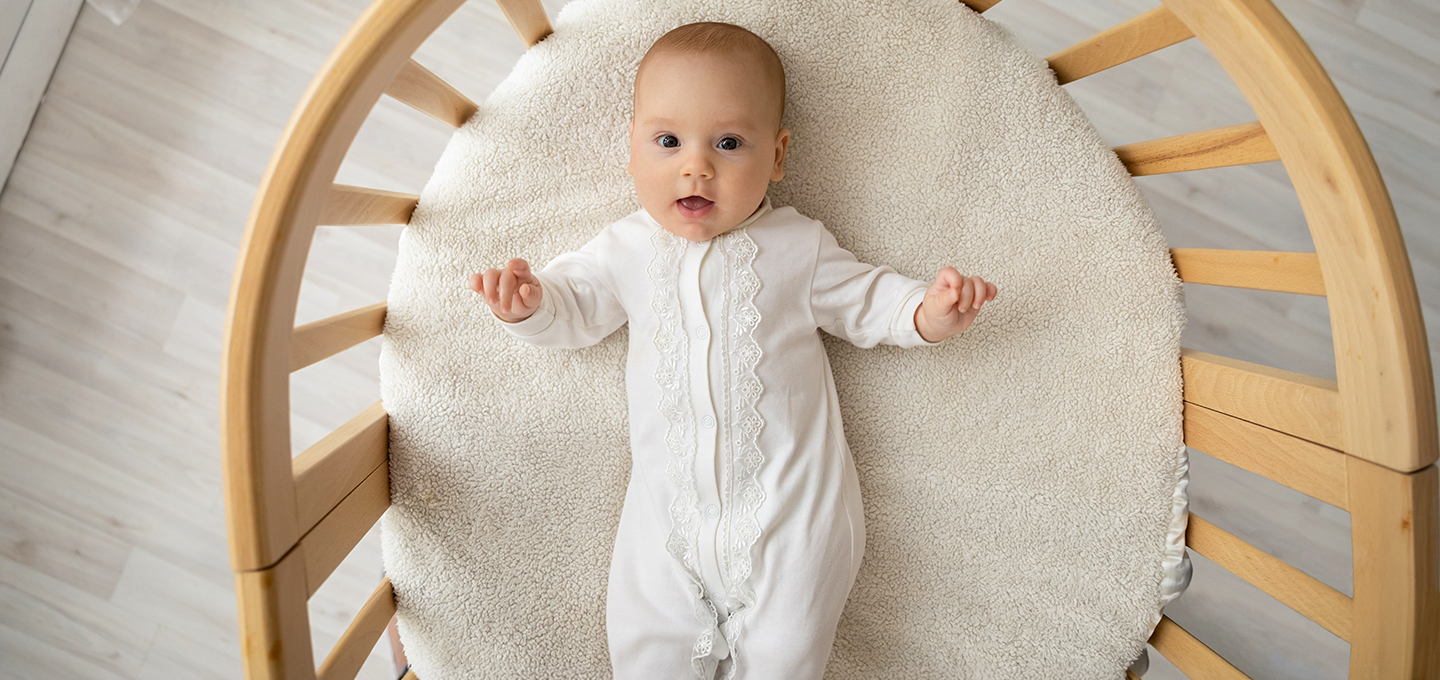
Overtiredness: Why it Affects Your Baby’s Sleep and How to Prevent it


The beginning of your baby’s life is often filled with long nights and little sleep. However, once your baby is developmentally able to sleep longer stretches, ensuring you’re putting your baby to sleep before they become overtired is key to helping them fall asleep easily and sleep for longer stretches––and ultimately get the restorative sleep they need to grow and thrive. Overtiredness is a common reason why babies don't sleep well. While it can take time to solve your baby’s issue of overtiredness, there are ways to get them back on track. Read on for more about how to stop your baby from becoming overtired and what to do if overtiredness is affecting their sleep.
What is Overtiredness?
Ever heard of a second wind? That burst of energy is often caused by overtiredness. Overtiredness happens if you stay awake even when your body is ready for sleep. Your body releases the stress hormones cortisol and adrenaline to keep you awake. In turn, it becomes harder to relax for bed, and you miss out on the crucial sleep that's needed. Overtiredness in your baby happens when you put them to sleep past their wake window, or if they skip out on sleep. An overtired baby can struggle to fall asleep, stay asleep, and sleep late in the morning. Once a baby is overtired, it can be difficult to get them out of the pattern of overtiredness.
How Do I Know if My Baby is Overtired?
There are different ways to know if your baby is overtired. If your baby was previously an okay sleeper but suddenly stops sleeping well, they could be overtired. Overtiredness can also happen if your baby stayed up past their bedtime, didn’t nap well, or had an extra busy day.
Signs your baby is overtired could include
Signs of overtiredness can be like signs of sleep regression.
Why is Overtiredness So Common?
Sleep struggles, including overtiredness, are common in the beginning of your baby’s life. Studies show that more than a quarter of babies will have sleep issues during their first six months.
Until your baby is 3-4 months old, their circadian rhythm isn’t mature, and they aren’t on a consistent sleep schedule or routine. Once your baby is developmentally able to be on a sleep routine, sleep struggles are still common, especially if their sleep schedules become out of whack. If your baby misses a sleep cycle, they likely will become overtired.
Once your baby is overtired, they often struggle to fall asleep. Even if they can fall asleep, they may still wake up often or early. The constant and early wake ups create a cycle of sleep that’s hard to get out of––a baby who is overtired gets less high-quality sleep because they are going to bed later and waking up often, and then they struggle to fall asleep the next night, which continues to cycle.
How to Help Your Overtired Baby Sleep Better
The cycle of an overtired baby can be hard to break. How to help your baby stop being overtired can start with reducing the level of the hormone cortisol in their body. Cortisol is the stress hormone known for keeping you awake or letting you know you’re in danger.
Ways to calm and soothe your baby such as rocking and singing lullabies often help calm an overtired baby so they can fall asleep. Other physical support that is known to help with an overtired baby could be lightly swaying or massaging your baby, playing music, or turning the lights down low.
Luckily, as a baby gets older, they start to understand that when it’s dark out it’s time to sleep. A consistent bedtime routine at night will help your baby’s internal clock tell them that it’s time to relax and go to sleep. If your baby has a sleep routine you’ve followed in the past, it’s helpful to continue following that routine if your baby is overtired, which can cue it’s time to sleep.
Whether your baby is overtired or not, try not to feed your baby to help them fall asleep ––this could lead to your baby associating feeding with sleeping and form a bad sleep habit. The longer you continue reinforcing a negative sleep habit for your baby, the harder it would be to break that habit.
The importance of early bedtimes for overtired babies
When it comes to solving the issue of overtiredness for your baby, the best thing you can do to help them catch up on sleep is putting them to sleep early. An earlier bedtime helps solve the issue of “sleep debt” because the most restorative sleep happens before midnight, so putting them to bed early can help them catch up on sleep cycles and then get back the sleep they need to get their circadian rhythm back on track.
A later bedtime will not help your baby sleep longer at night. It will lead to more overtiredness, more stress hormones, and more resistance to sleep. And if they do fall asleep, it likely will be a light sleep and they’ll often wake.
Preventing Overtiredness in Babies
One of the most important parts of preventing overtiredness is ensuring you put your baby to sleep at the right time according to their sleep cycles. Take this free 3-minute sleep assessment to figure out the best time to put your baby to bed tonight. Not only does the right bedtime help your baby fall asleep faster and stay asleep longer, but it also helps ensure they get the restorative sleep they need to grow and develop.
Another solution to make it easier to prevent overtiredness in your baby is to download the Smart Sleep Coach by PampersTM app and use its Smart Schedule, which will notify you when your baby’s sleep time is coming up. The app will also help you learn your baby’s sleep cues to make sure you don’t miss a wake window, which can lead to overtiredness.
Keep in mind it may be tempting to skip naps to make your baby sleep better, but it will backfire. Daytime sleep is important for nighttime sleep––it prevents your baby from becoming overtired and releasing hormones that keep them awake.
If your baby is showing signs of energy around bedtime, keep treating it as bedtime and don’t start playing with them. This could reinforce not sleeping when it’s time to sleep.
FAQS AT A GLANCE
One of the best ways to break the cycle of overtiredness for your baby is by putting them to bed earlier. An earlier bedtime can help them catch up on sleep, since the most restorative sleep happens in the beginning of the night. Try to keep their last wake window before bed longer, depending on their age. Also, make sure not to introduce unhealthy sleep habits, which can make it more difficult for your baby to become a strong independent sleeper.
Bottom Line
It’s exhausting for everyone when your baby is overtired. While overtiredness is a difficult cycle to break, with the right approach it’s possible.
If you’re struggling with your baby being overtired, it’s important to keep up with your routine, try for earlier bedtimes, and don’t introduce new habits or crutches to get your baby to sleep.
It often takes time to end the cycle of overtiredness for a baby, but with anything baby sleep, it’s solvable!
- Pediatrics, “Developing circadian rhythmicity in infants”
- Sleep, “The development of circadian rhythms in a human infant”
- Nature and Science of Sleep, “Infant sleep and its relation with cognition and growth: a narrative review”









